The young entrepreneurs embracing neurodiversity
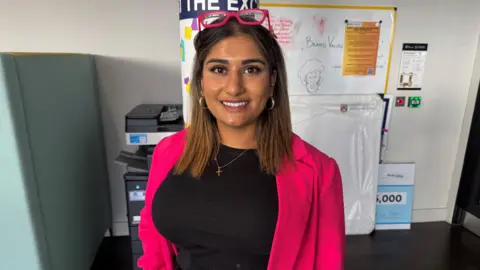 BBC
BBCWhen ZeZe Sohawan was younger, she was diagnosed with autism, psychosis and a personality disorder and spent time in the care system.
"I was sectioned in mental health units for four years which is a long time but actually, the average length of stay for an autistic person is five-and-a-half years," she said.
Now a mental health advocate, the 23-year-old from Birmingham, has since published a book, delivered a Ted Talk and received British Citizen and Diana awards for services to healthcare.
In 2022, she used her experiences to start her own charitable organisation, Emotion Dysregulation in Autism [EDA]. So far, it claims to have helped more than 1,000 young people to manage their emotions safely.
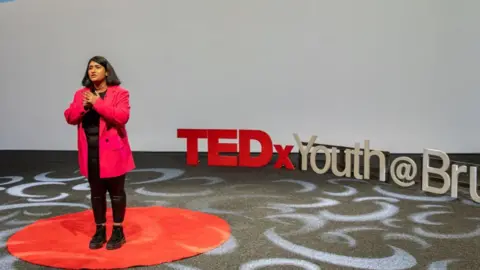 TedX Talks
TedX TalksShe told the BBC she was inspired after she was sectioned and set it up so it would become the resource she needed but didn't have when she was younger.
"I think for a long time, being in hospital, I didn't have a voice, my voice was silenced, I had no voice, no choice."
In the years since, ZeZe has spoken at several international conferences and has had a film made about her.
Her charity offers autistic children and young people a community peer support service, which aims to improve recovery outcomes and feelings of empowerment.
Passionate about transforming the service provision for autistic young people, ZeZe said the main challenges was the public not understanding autism and "autistic people not understanding themselves," she said.
"I think autistic people don't have access to good quality services to help them understand their autism and that leads to people not understanding themselves, being bullied, wanting to take their own lives because of the struggles they are having," she said.
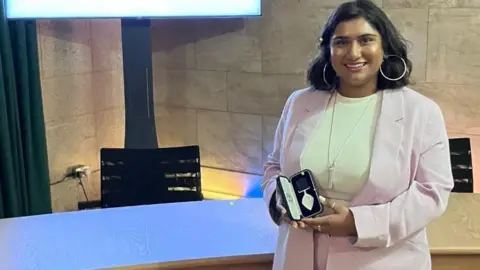 ZeZe Sohawon
ZeZe SohawonAutism spectrum disorder (ASD) - its medical name - is the name for a range of conditions which affect how a person communicates and interacts with the world around them, as well as their interests and behaviour.
For ZeZe, a neuroscientist and aspiring psychiatrist, what matters is helping others understand how to help.
She said some people had to wait years for an autism diagnosis and were "left in the lurch".
"We just have different neurotypes, that's all it is but it's so hard for the public to understand that," she explained.
"I want people to know that from my story, I turn my pain into power and into purpose - and actually anyone can do that, it's just about being determined enough to get there."
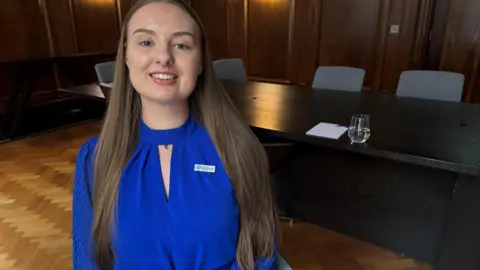
Iveta Pudilova, 23, co-founded National Neurodiversity Training and is an advocate for inclusivity.
A proud "adopted Brummie," she first learnt about neurodiversity after her sister Vera was diagnosed with autism. The pair later set up the Happy Autistic Lady venture together.
"I went on my own personal journey of realising that I'm neurodivergent too and supporting other neurodivergent people to either explore their neurodiversity and access a diagnosis or be confident with self-diagnosis," Iveta said.
Neurodivergence is an umbrella term that includes a number of conditions including ASD, attention-deficit hyperactivity disorder (ADHD) and dyslexia.
Since setting up her company in November, the University of Birmingham graduate has so far delivered neurodiversity training to seven organisations and 350 people, helping them to understand how to better support employees.
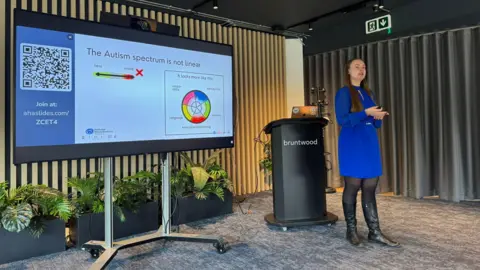 Iveta Pudilova
Iveta PudilovaShe said managers and staff were often scared to talk to neurodivergent employees because they might not have the language to manage conversations.
"Neurodiversity training is not just a checkbox exercise," she said.
"We target both neurodivergent employees to help them self-advocate and lean into their strengths but also educate the wider employee network and managers to understand how to actually support neurodivergent teams."
Iveta wants others to know that having a neurodivergent condition is a strength, both in and out of the workplace.
"If you're scared to talk about neurodiversity, don't be, because it can be as simple as just bringing up the topic."
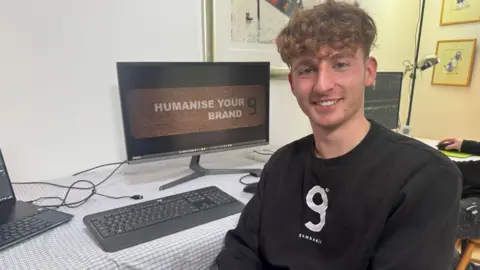
Fellow entrepreneur Alexios Zachariades-Layland, dropped out of university to launch Joobii, which turns job adverts into video.
The 22-year-old, who has dyslexia, set up the platform to help those who struggle with reading and writing and went on to film recruitment videos out of a home office in his granddad's back garden in Edgbaston for 150 businesses.
"Jobs don't really sort of advertise [to people with dyslexia] in a way that they should," he said.
"[I found] looking for jobs and opportunities online a very sort of frustrating thing to do."
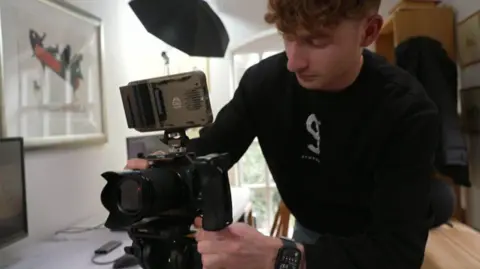
Since then, Alexios has founded a creative agency to help local businesses connect with younger audiences through video.
He now runs Gumbudii full time and wants other people to know that having dyslexia shouldn't hold anyone back.
"I think a lot of people can let their disadvantages get the better of them and maybe look at those of 'oh I can't do this because of this', I think if anything, look at that as your advantage," he said.
"Never let them stop you from doing anything, I think that's the most important thing."
ZeZe, Iveta and Alexios previously took part in a young business training programme run by Birmingham-based company Epic Entrepreneurs.
Calum Sawford, its programme director, said they supported youngsters through coaching, skills and mentorship to help them launch businesses.
He added they wanted to give them the "skills, tools and resilience to realise their business goals and entrepreneurial aspirations".
Follow BBC Birmingham on BBC Sounds, Facebook, X and Instagram.
